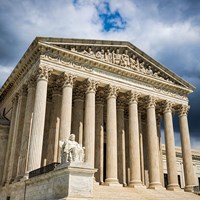The United States Supreme Court – More Partisan or Principled?
As the United States Supreme Court concluded its most recent term, a flurry of consequential decisions were released. As is typical, some of the most controversial decisions were released towards the end of the term (which ended June 30, 2023).
Given the political polarization in the United States, it would be easy to assume that most (if not all) of the Supreme Court’s decisions were 6-3 along party lines. Fortunately, that assumption has proven not to be true in most cases.
A summary of some these most recent decisions follows:
- Biden v. Nebraska: Invalidating Biden’s student loan forgiveness plan; 6-3 along party lines.
- 303 Creative LLC v. Elenis: Holding that Colorado cannot compel a web designer to create websites for same-sex weddings; 6-3 along party lines.
- Abitron Austria GmbH v. Hetronic Int’l, Inc.: Holding that two provisions of Lanham Act at issue prohibiting the unauthorized “use of marks in commerce” that is likely to cause confusion in the marketplace is limited to claims where infringing use is domestic rather than international; no dissenting opinions and Jackson joined the conservative majority.
- Students for Fair Admissions, Inc. v. Harvard College: Holding that Harvard’s and UNC’s admissions policies violated the Equal Protection clause of the 14th Amendment; 6-3 along party lines.
- Groff v. DeJoy: Holding that Title VII of the Civil Rights Act of 1964 requires an employer that denies a religious accommodation to show that the burden of granting an accommodation would result in substantial increased costs in relation to the conduct of its particular business; unanimous decision.
- Mallory v. Norfolk Southern: Holding that a PA statute (requiring NS to register in PA and consent to suit there) did not violate due process; 5-4, with dissent by Barrett, Roberts, Kagan and Kavanaugh.
- Coinbase, Inc. v. Bielski: Holding that, under the Federal Arbitration Act, a district court must stay its proceedings while an interlocutory appeal on the question of arbitrability is ongoing; 5-4, with dissent by Jackson, Sotomayor, Kagan and Thomas.
- Yegiazaryan v. Smagin: Holding that Plaintiff (who lived in Russia) stated a valid RICO claim in California against a California resident who evaded collection efforts in California on an arbitration award confirmed to judgment in California by diverting funds to a bank in Monaco; 6-3, with Alito, Thomas and Gorsuch dissenting.
- Jack Daniel’s Properties, Inc. v. VIP Products LLC: Holding that a dog toy shaped like a Jack Daniels bottle may violate Jack Daniels trademark and there is no blanket for protection for parody that mimics the trademarked features; unanimous decision.
- Allen V. Milligan: Holding under the Voting Rights Act that plaintiffs demonstrated that Alabama HB1 likely was an unconstitutional gerrymandering map; 5-4, with Sotomayor, Kagan and Jackson joining Roberts and Kavanaugh.
- Dubin v. United States: Holding that conviction for overbilling Medicaid did not automatically support conviction for identity theft; no dissenting opinions.
- Health and Hospital Corporation of Marion Cty. v. Talevski: Holding that violations of the Federal Nursing Home Reform Act are enforceable civil rights violation claims under Section 1983; 7-2, with Thomas and Alito dissenting.
- Sackett v. EPA: Limiting what is considered a wetland under the Clean Water Act and holding the Act extends to only wetlands that are “as a practical matter indistinguishable from waters of the United States”; no dissenting opinions.
- Andy Warhol Foundation For Visual Arts, Inc. v. Goldsmith: In considering copyright “fair use” regarding Andy Warhol Foundation’s licensing “Orange Prince” to Conde Nast, the first factor weighed in favor of the original photographer whose photo Warhol had altered; 7-2, with Kagan and Roberts dissenting.
These decisions provide reason for hope that the High Court remains more principled than partisan, and a principled court advances both justice and the ability for citizens to make informed decisions.


